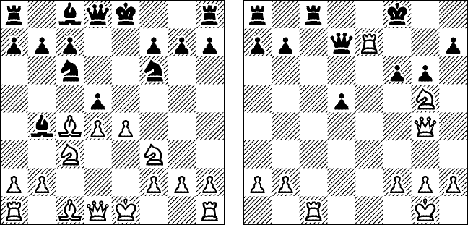 Game Five: Steinitz-von Bardeleben, Hastings 1895 "Whoever sees no other aim in the game than that ofgiving checkmate to one's opponent, will never become a good chess player."1895 found Wilhelm Steinitz past his peak, having lost the World Championshipto the 25-year-old Emanuel Lasker the previous year. "I may be an oldlion," he remarked defiantly, "but I can still bite someone'shand off if he puts it in my mouth." The someone in this case is Kurtvon Bardeleben, who went into a rage and stalked away from the game afterthe 25th move--after he had been put in check five consecutive turns. VonBardeleben, who intentionally lost on time rather than suffer the ignominyof resigning, later committed suicide in 1924 by jumping from a window.Steinitz, who was known to drink copious quantities of champagne duringmatches "to fortify his nerves," completed the total humiliationof his opponent by demonstrating to the audience a series of checks thatled, inexorably and inevitably, to checkmate on the 35th move. Reuben Finedescribed it as "A game with a combination which ranks amongst themost profound ever made." The following year, however, Steinitz wasagain defeated by Lasker +2=5 -10, and suffered a nervous breakdown, claimingto be able to make telephone calls without the use of any hardware. Steinitz,who Harold Schonberg in Grandmasters of Chess referred to as "themost unpopular chess player who ever lived" died penniless in 1900and was buried in a pauper's grave at Brooklyn's Evergreen Cemetery. |
![]()
| (PREVIOUS) | (NEXT) |